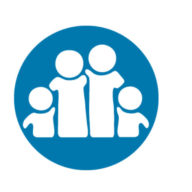Do you ever find yourself wondering why you seem to have the same interactions over and over with your family? Or feeling like you’re an adult while you are walking up the path toward your childhood home, and a child as soon as you walk through the door?
 You are not alone. Most of us fall back into the same patterns we established while growing up—one child may be the peacemaker, one the troublemaker, one the comic, and so on. This is called regression and it’s an expected, predictable phenomenon. These patterns are encouraged by environmental cues, by memories, internal stories about our lives, and our beliefs about what others are thinking.
You are not alone. Most of us fall back into the same patterns we established while growing up—one child may be the peacemaker, one the troublemaker, one the comic, and so on. This is called regression and it’s an expected, predictable phenomenon. These patterns are encouraged by environmental cues, by memories, internal stories about our lives, and our beliefs about what others are thinking.These patterns come out more strongly when we are nervous, worried, insecure, or overwhelmed. Given that most people feel at least a little worried about family gatherings, we can predict that many folks are experiencing regression when they attend holiday gatherings. The results of regression (the feelings, confusion, and disappointment) are often exacerbated by hopes and expectations that it will go differently this time.
Even when we consciously try to avoid playing our assigned role, it can be hard because everyone around us has a role, too, like a choreographed dance. When we change the steps, everyone has to adjust a bit. If your role is to be the silent little brother (even though you’re now an adult with your own family, a career, and valuable knowledge about lots of things), your older siblings may not make room for your contributions to the topic being discussed.
Being your adult self and bringing your best self to a gathering of people who have known you a really long time can be extremely difficult. When you walk into that gathering, what do you think people see? What do you believe they are thinking about you?
- Your strengths?
- Your best accomplishments?
- Your limitations?
- Your childhood foolishness?
- Your carefully constructed public image?
- Your internal struggles?
- The sibling scorecard that tracks who has done the most (or least) to gain favor with your parents?
- Or, who has received the most help from parents?
What armor do you find yourself putting on before arriving at the gathering? What phrases/comments do you say to yourself and your partner/children as you prepare to arrive about what to do, what to avoid, how to respond to the people participating?
 Imagine what it would be like to go to the holiday gathering without those beliefs, the armor, and admonitions to yourself and your partner/children.
Imagine what it would be like to go to the holiday gathering without those beliefs, the armor, and admonitions to yourself and your partner/children.Seriously, take a moment to imagine what it would be like to walk through the door without the weight and constriction of your assigned role and responsibilities, your past mistakes, your worries about your place in the family. You might close your eyes, breathe deeply, and allow feelings to bubble up.
What happens in your shoulders, neck and back when you are not believing the stories? What happens in your face and your mind when you are free of the roles and the judgment? What happens when you are able to arrive knowing that you’re doing the best with what you’ve got? How does that change the tone in your body-mind-spirit system?
For most of us, it allows us to feel more free, more relaxed, a little taller and lighter. It helps us to connect, be curious, find humor and compassion for ourselves and others — and it moves us further away from the expected regression to old habits.
What would be the harm in believing that people see your best self? That everyone is thinking about your strengths, your accomplishments and efforts? That people want the best for you and for themselves? What if, instead of armoring up and trying to be more clever or unaffected by the regressive roles, you leave those old fears and beliefs on the floor, even before you start getting ready to go to the gathering?





